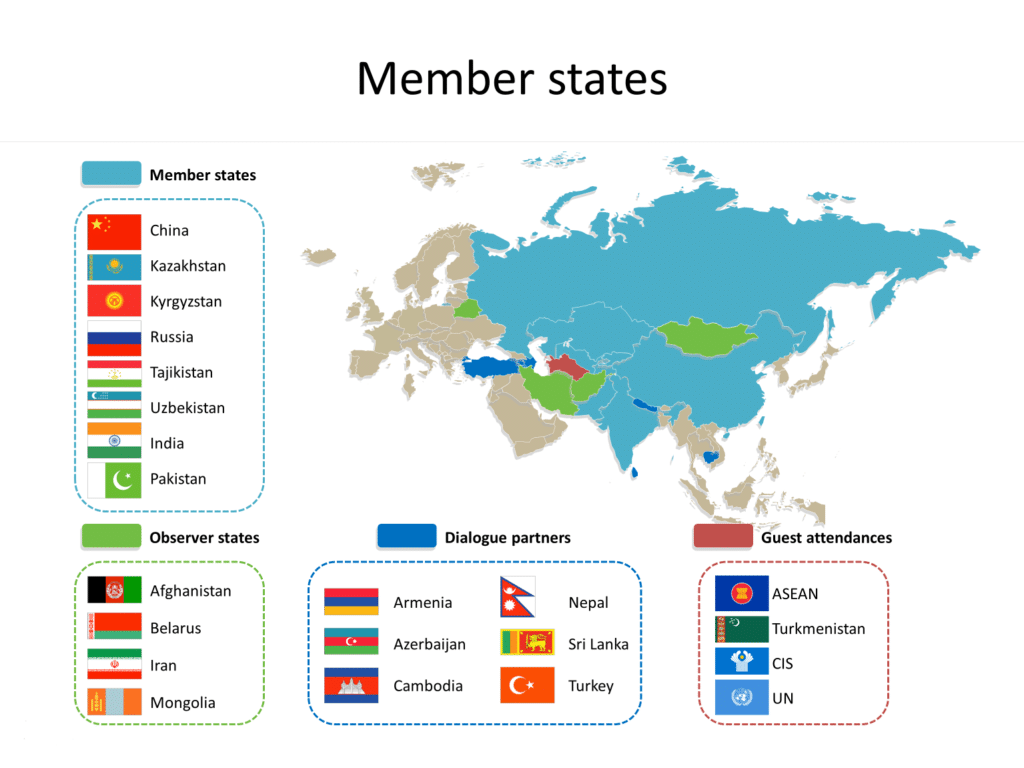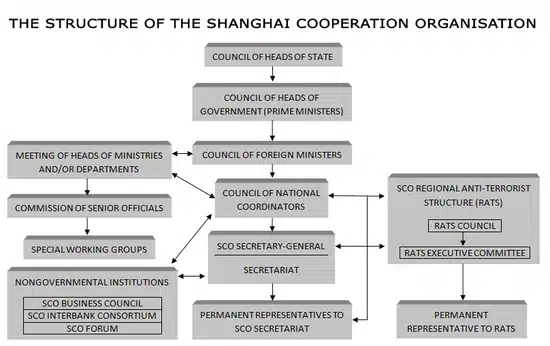- SCO is a permanent intergovernmental international organization.
- It’s a Eurasian political, economic and military organization aiming to maintain peace, security, and stability in the region.
- It was created in 2001.
- The SCO Charter was signed in 2002 and entered into force in 2003.
- Shanghai Cooperation Organisation (SCO) covers 40% of the global population, nearly 20% of the global GDP, and 22% of the world’s landmass.
- It has two Permanent Bodies –
- SCO Secretariat in Beijing
- Executive Committee of the Regional Anti-Terrorist Structure (RATS) in Tashkent.
Shanghai Cooperation Organization (SCO) Genesis
- Prior to the creation of SCO in 2001, Kazakhstan, China, Kyrgyzstan, Russia, and Tajikistan were members of the Shanghai Five.
- Shanghai Five (1996) emerged from a series of border demarcation and demilitarization talks that the four former Soviet republics held with China to ensure stability along the borders.
- On 15 June 2001, the leaders of these nations and Uzbekistan met in Shanghai to announce a new organization with deeper political and economic cooperation; the SCO Charter was signed on 7 July 2002 and entered into force on 19 September 2003.
- Its membership has since expanded to eight states, with India and Pakistan joining on 9 June 2017. Several countries are engaged as observers or partners.
- India and Pakistan became members in 2017.
SCO Objectives:
- Strengthening mutual trust and neighbourliness among the member states.
- Promoting effective cooperation in -politics, trade & economy, research & technology, and culture.
- Enhancing ties in education, energy, transport, tourism, environmental protection, etc.
- Maintain and ensure peace, security, and stability in the region.
- Establishment of a democratic, fair and rational new international political & economic order.
Membership:
- Kazakhstan, China, Kyrgyzstan, Russia, Tajikistan, Uzbekistan, India, and Pakistan.

Structure:
- Heads of State Council: The supreme SCO body which decides its internal functioning and its interaction with other States & international organizations, and considers international issues.
- Heads of Government Council: Approves the budget, considers and decides upon issues related to economic spheres of interaction within SCO.
- Council of Ministers of Foreign Affairs: Considers issues related to day-to-day activities.
- Regional Anti-Terrorist Structure (RATS) – Established to combat terrorism, separatism, and extremism.
- SCO Secretariat:
- Based in Beijing to provide informational, analytical & organizational support.
- Official language:
- The official working language of the SCO Secretariat is Russian and Chinese.

Importance of SCO for India
The Central Asian region is richly endowed with vital minerals and natural resources. India also has a major interest in security, trade, geopolitical, and energy cooperation.
- SCO membership has also helped India to be a major Pan-Asian player, which was recently boxed in the South Asian Region.
- It is important for India’s stated policy of pursuing “multi-alignments”.
- From the Indian perspective, SCO is extremely important as the security, strategic, economic, and geopolitical interests are closely intertwined with developments in this area.
- The challenges of terrorism, radicalism, and instability pose a grave threat to Indian sovereignty and integrity.
- A stable Afghanistan to is in India’s interest, and RATS provides access to non-Pakistan-centred counter-terrorism information.
- With the landlocked states of Central Asia, accessing these resources becomes difficult. In this regard, India has prioritized the construction of the International North-South Transport. Joining SCO will help India to connect Central Asia with South Asia.
- Central Asia is part of India’s extended neighborhood. India’s relations with countries in the region have enormous potential for enhancing ties in areas such as economy, security, policy, investment, trade, connectivity, energy, and capacity development.
- After India’s membership in the SCO, it has provided an opportunity for the leadership of India, including prime ministers, to meet with their counterparts from Central Asia, Russia, China, Afghanistan, and others regularly and frequently.
- India has demonstrated its keen interest in strengthening multi-faceted relations with Central Asia through the Prime Minister’s historic visit to the five Central Asian Republics in July 2015. Several agreements were signed and new initiatives were launched.
- The TAPI gas pipeline is an example of a mutually beneficial project.
- In the future, India’s development experience, particularly in promoting agriculture, small and medium enterprises, pharmaceuticals, and information technology, can be of immense benefit to Central Asian countries.
Challenges to SCO
The SCO mechanism provides an important guarantee for its multilateral cooperation ahead. Though, the challenges lie ahead, which are:
- The intensification of the great power game in the region. It includes combating terrorism, extremism and separatism, drug and weapons trafficking, illegal immigration, etc.
- The weakness of the sense of community between its member states
- The transformation of cooperation pattern faces after expansion. Despite being geographically close, the rich diversity in members’ history, backgrounds, language, national interests and form of government, wealth and culture makes the SCO decision-making challenging.
